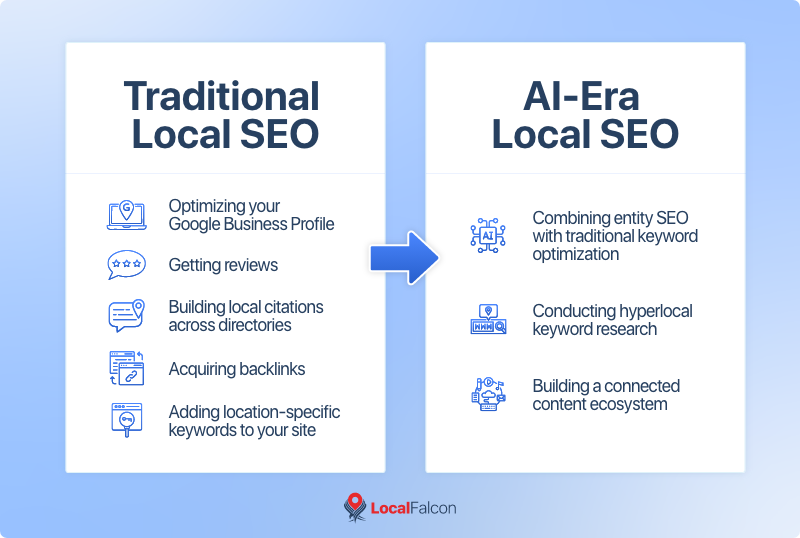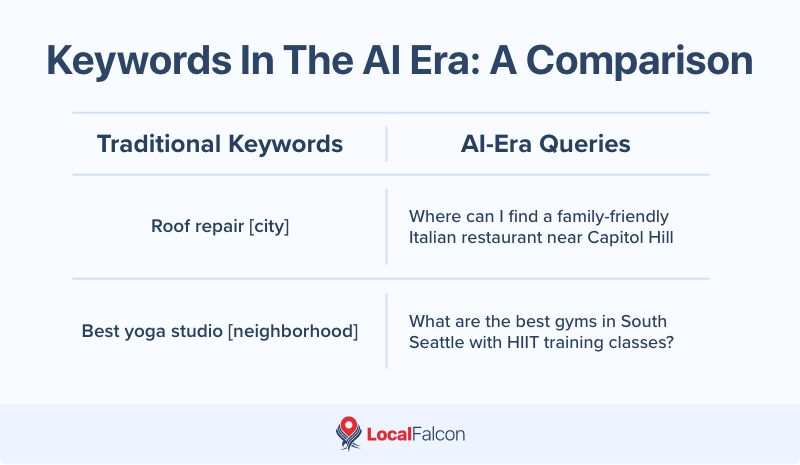Ranking on Google Maps and Search, in the Google 3-Pack, is still a huge driver of local search traffic and business, but it's no longer everything. To succeed in local SEO in the AI era, you need a solid local content strategy that not only helps your business site rank in organic search results but also increases your visibility in AI-generated summaries and answers.
The increasing prevalence of AI in search, through Google AI Overviews, AI Mode, Gemini, ChatGPT, Grok, Claude, and other AI assistants, means local businesses can no longer rely on simple keyword matching to drive content marketing results. Instead, they need a localized content strategy that builds entity-based relevance, integrates hyperlocal knowledge, and responds to both traditional and AI-driven search behaviors.
What You'll Learn About Local SEO Content Strategy in This Article
We'll walk through how to develop content marketing strategies for local SEO in today's search environment, including:
- Why AI has shifted the rules of local content marketing
- How to design a content framework that goes beyond traditional keywords
- The role of entities, neighborhoods, and community-specific content
- Why keyword research is still critical (and how it's changing)
- How to use tools like Local Falcon's Local Keyword Tool to uncover hyperlocal opportunities
The New Reality of Local SEO in the AI Era
Until not long ago, "local SEO" meant doing a few main things:
- Optimizing your Google Business Profile
- Getting reviews
- Building local citations across directories
- Acquiring backlinks
- Adding location-specific keywords to your site
These tactics are still crucial to local SEO, but when it comes to local content marketing, things have changed a bit.
Simply adding a bunch of high-volume local keywords to pages throughout your site to improve traditional organic rankings isn't going to cut it anymore. You need to provide Large Language Models (LLMs), or what's more commonly referred to as AI, with more context to ensure AI search visibility.
Why? AI-generated results, like Google AI Overviews and ChatGPT answers, often summarize local options and can even provide direct recommendations of specific businesses. If your business doesn't appear in those summaries, you risk losing visibility even if you're ranking organically.

Building Locally Relevant Content That Connects
To make your local SEO content strategy effective in the AI era, you need more than a handful of keyword-optimized pages. Search engines and AI tools are looking for signals that your business is genuinely tied to the neighborhoods you serve. That means creating content that reflects the character of local communities and the things people actually care about.
A good place to start is by narrowing your focus beyond just the city name. Look at the individual neighborhoods, districts, or suburbs where your customers live and work. For instance, a business in a large metro area might want to highlight two or three nearby communities where demand is highest or where they're looking to grow.
Once you've identified those areas, dig deeper into the details that make them unique. Think about the schools, landmarks, seasonal events, or well-known gathering spots that residents associate with those neighborhoods. These are the kinds of connections, or SEO entities, that search engines recognize as evidence of local relevance.
From there, you can develop content that feels like it belongs in that community. Instead of repeating a generic keyword, create resources that naturally tie your expertise to what locals know and experience. For example, you might write a guide that connects your service to a neighborhood event, publish an article that references a nearby landmark, or build a service page that explains how you serve families around a particular school district.
The key is to go beyond surface-level keyword mentions and show that you understand the places and people you're trying to reach. Done well, this approach helps your content stand out in AI-generated results while also making your business feel more authentic to potential customers.
Entities vs. Keywords: Why Both Still Matter
Before you can build a localized content strategy adapted to AI, it's important to understand that LLMs prioritize context and entities over keyword stuffing.
Search engines increasingly rely on understanding relationships between businesses, neighborhoods, landmarks, and customer needs to surface locally relevant information in AI-generated local search results. That's why your local content strategy has to go deeper than simply including keywords like "family dentist in [City]" over and over again throughout your site.
However, some marketers might suggest that traditional keywords don't matter anymore, and that search is ALL about entities. That's not quite true.
Entities are crucial for helping AI and search engines connect your business to a local area. But traditional search keywords are still essential for capturing traffic from classic search behavior, or those users who still type short, 3 to 5 word queries like "roof repair [City]" or "best yoga studio [Neighborhood]" to find businesses near them. Ranking for these terms still drives clicks and leads.
That being said, users are also now asking full-sentence, conversationally-phrased questions in search. Things like: "Where can I find a family-friendly Italian restaurant near Capitol Hill?" or "What are the best gyms in South Seattle with HIIT training classes?"

These conversational, long-tail queries often trigger AI summaries and are frequently used to prompt AI assistants, including AI-powered voice search tools. If your content doesn't include phrasing that aligns with these natural-language prompts, you could potentially miss out on being included in AI-driven results.
The bottom line is that, in the AI era, a strong local SEO content strategy combines entity SEO with both traditional short-tail and long-tail keyword optimization.

How Hyperlocal Keyword Research Can Help You Build a Future-Proof Local Content Strategy
Traditional keyword research tools are still useful, but they typically focus on national-level search volume. That's not always helpful for local SEO, where intent and geography matter more than raw numbers.
This is where hyperlocal keyword research comes in. Instead of guessing which phrases people in your neighborhood or service area are using, you can analyze and build around them based on your exact location.
Using Local Falcon's Local Keyword Tool To Guide Your Localized Content Strategy
One of the best tools for hyperlocal keyword research is Local Falcon's Local Keyword Tool. Sure, we may be a little biased, but it's the first local keyword research tool that allows you to:
- Enter a seed keyword (can be one of your GBP categories, services, competitor keywords, or any other relevant term)
- Select a specific location (choose from your saved GBP locations or manually enter a city, neighborhood, postal code, etc.)
- Generate hyperlocal keyword variations for both traditional search AND AI search based on real search data and AI reasoning
- Understand the specific search intent behind each keyword (informational, commercial, transactional, navigational)
- See the potential value of keywords based on local factors with a Weighted Yield Number (WYN) score
For example, a seed keyword of "HIIT gym" for the location "South Seattle" might surface localized terms like:
- "HIIT gym Columbia City WA" (traditional search)
- "HIIT workouts Beacon Hill Seattle" (traditional search)
- "HIIT classes for beginners South Seattle" (traditional search)
- "Is there a HIIT gym open late in Columbia City WA?" (AI search)
- "Who offers affordable HIIT workouts in Beacon Hill Seattle? (AI search)
- "Are there women-only HIIT classes in South Seattle?" (AI search)
These keywords reveal traditional keywords (HIIT gym/workouts/classes), entity connections (neighborhoods, attributes), and conversational phrasing that aligns with AI-driven searches.
That's a ton of information that you can use to build out your localized content strategy. Armed with data-backed insights, you can create pages, blog posts, and FAQs that directly match the way people in your area search and the intent behind their searches.
Building for Humans, Not Just Search Engines
One of the risks in local SEO is over-optimizing for algorithms while forgetting the end reader. Remember that the ultimate goal of your local content strategy is not just ranking, but earning trust and driving conversions.
Here are some foundational principles to guide you:
- Be genuinely helpful: Create content residents would actually benefit from and potentially share, not just keyword-laden filler.
- Engage with the community: Highlight local events, support community organizations, interview other business owners, collaborate with adjacent businesses, etc.
- Keep it updated: Outdated local content can hurt credibility and relevance, so make sure to update things regularly.
AI and traditional search engine algorithms alike reward fresh, accurate, and contextually rich content with URL citations and rankings. But just as importantly, your potential customers are more likely to buy from a business they see as a trustworthy member of the local community!
The Future of Local Content Strategy
As AI continues to become embedded throughout local search experiences, the businesses that win will be those that embrace both technology and authenticity. That means:
- Staying ahead with local keyword research tools that reveal hyperlocal search behavior
- Creating a localized content strategy that reflects real community knowledge and connections
- Blending traditional keyword optimization with entity-driven storytelling
- Building a connected content ecosystem rather than isolated, keyword-stuffed posts
This helps position your business not only to rank well on Google for traditional local keywords, but also to show up in the AI-generated summaries and answers that are reshaping how people discover local businesses.
Final Thoughts
Implementing a successful, future-proof local SEO content strategy doesn't require choosing between keywords or entities, but rather weaving them together into a cohesive, authentic content framework.
If you want to drive local traffic, show up in AI results, and establish your business as a true part of the community, the path forward is clear:
- Research hyperlocal keywords
- Create content around business- and neighborhood-specific entities
- Publish resources that your neighbors actually care about
That's how you'll stand out in a crowded search ecosystem and future-proof your visibility as AI continues to shape local search.


